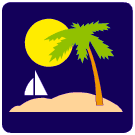

Goals:
1. This overnight field trip will help students connect the first eight days of the ALOHA
curriculum to life on Washington Island in Door County, Wisconsin.
2. This activity allows students to see first-hand how water is a major part of life on an island.
They will understand the impact of water on their environment.
Resources/Materials:
1. Washington Island Internet information
--http://doorcountyvacations.com/communities/wi.html
2. Parent(s)/Guardian(s) permission slips
3. Ferry reservations
4. Bus reservations
5. Overnight accommodations at a Washington Island school (Must contact the Washington
Island School District beforehand to make accommodations)
6. First-aid kit
7. Video tapes of newscasts (see Maui lesson plan)
8. Community legends book (see Kauai lesson plan)
9. Luau items (food, music, etc.)
10. Water testing materials (see attached lesson plan)
11. Bag lunches
12. Sleeping bags and pillows
13. Money (optional - Students may wish to purchase souvenirs.)
14. Any personal items the students, chaperones, and teachers wish to bring with them to the
island
Time:
2 days - 12 class hours
Procedure:
1. Students and chaperons should arrive at the school by 6:45 a.m. The bus leaves at 7:00
a.m. The bus ride will take approximately 2-2 1/2 hours.
2. When students arrive at the ferry, they will board. While upon the ferry, the students will eat
their bag lunches.
3. After students arrive on the island, they will leave their belongings at the school, then they
will engage in field work.
4. Students will conduct water testing and analyze the information. (see attached water testing
lesson plan).
5. Following the field work, the students will return to the school and relax by viewing their
Maui newscasts (refer to Maui lesson plans).
6. After the newscasts have been viewed, the group will engage in a Hawaiian luau. This luau
is designed to introduce Hawaiian culture, foods, and customs to the students. The luau is a
fun and enjoyable experience, which is also conducive to learning.
7. Following the luau, a campfire will be built. The group will gather around a campfire and
share the community legends which they created on Kauai (refer to Kauai lesson plans).
8. After the campfire, students will go to bed. Lights out at 11:00 p.m.
9. The following day, students will board the ferry (Need to make reservations for this ferry ride
- see Internet site: http://www.wwb.com/company/c007401.html. They will then travel by bus
back to school.
10. After arriving at school, students will eat lunch.
11. Following lunch, the entire group of students will engage in a discussion regarding what
they learned on Washington Island. Also, students may draw connections between
Washington Island and Hawaii. At this time the teacher may receive positive and/or
negative feedback regarding whether the students enjoyed the two-week unit on Hawaii.
12. After the discussion is complete, the students will write a journal entry about their
Washington Island experience. They may also include a reflection about the overall two
week unit on Hawaii.
Assessment:
1. In-depth classroom discussion (Criteria for success = Students must display evidence of
critical thinking. In other words, students should not just tell what they did on Washington
Island. Instead, they need to understand the importance of traveling there).
2. Journal reflection - which will be evaluated based upon the attached writing rubric (Criteria
for success = Students must make a connection between Washington Island and the Hawaiian
islands).
Curricular Strands and Major Concepts
1. Science - Water testing and analysis, aquatic habitat.
2. Math - Water temperature comparisons
3. Language Arts - Journals, discussion/communication, critical thinking, writing skills.
4. Social Studies - Newscasts, legends.
Possible Extensions:
1. When students return from field trip, they could view a movie that was filmed on a Hawaiian
island. Some of these movies are: George of the Jungle, King Kong, Jurassic Park, etc.
2. Have a guest speaker from Washington Island discuss what life is like living on an island.
The guest speaker's personal experience is very important because a one-day observation of
the island will not show the students everything. This will also give students a chance to ask
questions.
Go to Water Tests- Washington Island
Go to Schedule of Lessons